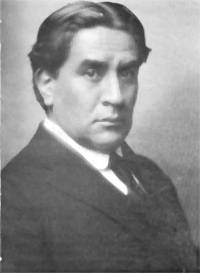Franz Tamayo
Franz Tamayo Solares | |
|---|---|
 | |
| Born | February 28, 1879 La Paz, Bolivia |
| Died | July 29, 1956 (aged 77) |
| Occupation(s) | Intellectual, writer, politician |
| Known for | Oratory, racial concepts, political influence |
| Notable work | Educational treatises, poetry, philosophy |
Franz Tamayo Solares (28 February 1879
Career and influence
Tamayo's
In politics, Tamayo originally supported the Liberal Party but switched to the opposition Republican Party around 1920. In 1931 he was appointed Minister of Foreign Relations by president Daniel Salamanca. He actually won the 1934 presidential elections, but these were annulled by the leaders of the military coup that toppled Salamanca from power.
This is an old anecdote about Franz Tamayo that is illustrative of his character:[citation needed]
Tamayo lived in La Paz, and every morning he would get up early and spend 15 minutes gazing from his balcony to the imposing Illimani, the highest of the mountains surrounding the city.
After a while, a man came to live in the same building as Tamayo, and one morning he saw him in his "ritual". "Franz", he called out, for Tamayo was well known in the city. "Franz!". After some minutes of shouting and receiving no answer, he lost his temper and shouted "For God's sake, Franz, what is your problem? I am trying to say 'good morning' to you" Tamayo turned around, his eyes on fire, and shouted. "¡Silencio! Dos cumbres se contemplan" ("Silence!, two giants gaze upon each other.)
Another anecdote is:[citation needed]
Tamayo was serving in the Bolivian House of Representatives when he gave one of his famed impassioned speeches before that august body. Inevitably, someone took exception to his thinking and booed the great poet and orator, tossing (of all things) a horseshoe at him to show his displeasure. Tamayo calmly picked up the horseshoe and said aloud "incidentally, would the gentleman who has lost his shoe please come up front to claim it?"
References
- ISBN 9789995412913– via Google Books.
- ^ "Franz Tamayo > Poemas del Alma". www.poemas-del-alma.com.
- ^ "Franz Tamayo, el insigne poeta boliviano".
- ISBN 1-884964-18-4.
- Mesa José de; Gisbert, Teresa; and Carlos D. Mesa, "Historia De Bolivia."
